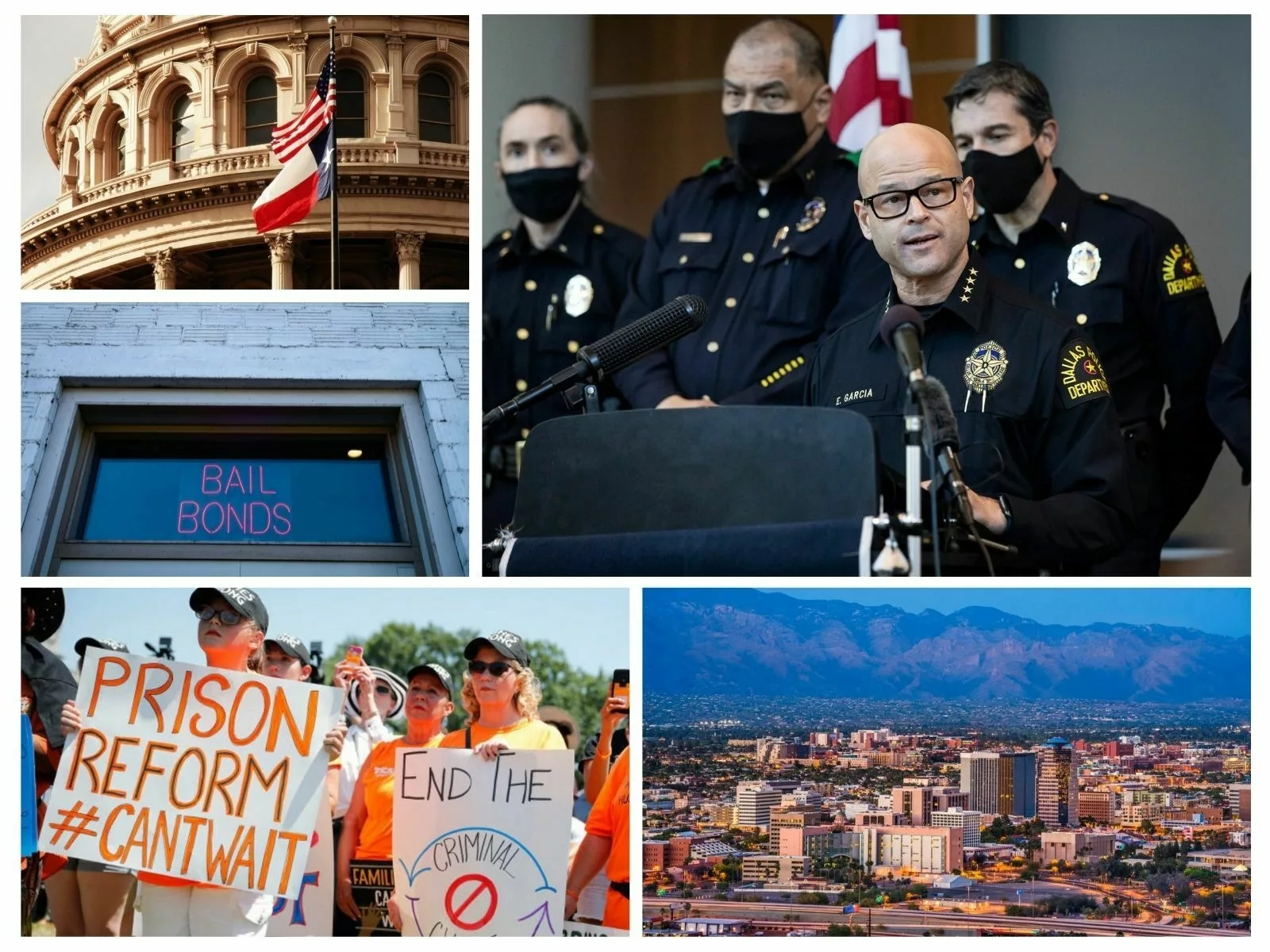For Damita Price, insurmountable court debt has made it all but impossible to re-enter society after a period of incarceration.
In 1996, Price was sentenced to life without parole for drug trafficking. She said she began selling drugs to pay for medical bills after her son was diagnosed with the incurable genetic disorder Duchenne Muscular Dystrophy and dropped by her insurer.
”I wanted to take care of my child and get him to his doctor appointments,” Price said. “And I got arrested.”
Price ended up serving 21 years in the Oklahoma prison system before then-Gov. Mary Fallin commuted her sentence in early 2018. She was relieved to get out. But soon she found herself plagued by court debt that she could barely keep up with.
In Oklahoma, the fine for a drug trafficking sentence can run up to $500,000. Price is unsure how much she owes in total. What she knows is that she must pay around $500 each month toward court fines and fees — including the cost of her probation program — or the state could return her to prison.
After nearly five years out, she still struggles. Her felony record makes it nearly impossible to find a living-wage job that also allows her to make payments. Her debt has also damaged her credit, making it difficult to rent an apartment or finance a car.
“It has been very, very tough for me,” Price said. “I feel like I’m never going to catch up. I live paycheck to paycheck. I can barely buy gas.”
For many people, especially those experiencing poverty and people of color, court fines and fees create a devastating financial burden and worsen conditions of poverty. In some cases, the inability to pay off court debt results in arrest, essentially criminalizing poverty. At the same time, it is an ineffective way for states to raise revenue.
It is so important to reform fines and fees. They are a way our justice system imposes a regressive tax.Cybele Kotonias director of criminal justice at Arnold Ventures
“It is so important to reform fines and fees,” said Cybele Kotonias, director of criminal justice at Arnold Ventures. “They are a way our justice system imposes a regressive tax, putting the cost of a court system that serves all of us on the backs of people who can least afford it — the people who are policed, charged, convicted, and incarcerated at the highest rates in this country — and significantly increasing their interactions with the justice system.”
Across the U.S., advocates are pushing lawmakers to eliminate harmful court debt. The Oklahoma Policy Institute has supported bipartisan legislation to alleviate fines and fees for indigent defendants and young people in the state, winning some key victories. Policymakers have also made progress in a diverse set of states, with California, Delaware, Louisiana, Massachusetts, and Texas all passing recent bills to scale back fees.
‘No Deterrent Effects’
The increased use of court fines and fees coincided with a movement of the early 2000s to move away from using state budget revenues to fund courts and other public services and toward a fee-for-service model. States began collecting not just on major offenses like drug trafficking but on everything from minor misdemeanors to traffic violations — creating a new and inconsistent revenue stream that simply acts as a tax by another name.
But research shows that court fines and fees have no real public safety benefits for local governments and cause significant harm to people in the legal system. A recent randomized controlled trial examined court fees for misdemeanor defendants in Oklahoma County over 12 months. The study found that defendants who were subject to court fees experienced high rates of new warrants, additional court debt, tax refund garnishment, and referral to collections agencies. Meanwhile, defendants who were relieved of court fees showed no increase in new criminal charges, convictions, or jail bookings.
“The study determined that court debt has no deterrent effects,” said David Gateley, a criminal justice policy analyst at Oklahoma Policy Institute, a nonpartisan think tank. “It just creates further justice involvement and criminalization for indigent defendants.”
The study also found low levels of repayment, with the court collecting under 5% of total outstanding debt, making it an unreliable source of revenue. Any fiscal benefit to local government appears to be extremely limited. “You can see how much court debt can come from just a misdemeanor conviction, how difficult it is to pay, and how much of it is not collected,” Gateley said.
Reforming Fines and Fees
Oklahoma Policy Institute is supporting efforts to reform the use of fines and fees in the state, where more than 50 local governments collect over 10% of their general revenue — and some as much as half — from fines and fees.
The organization’s research shows that fees for a misdemeanor offense average around $1,200. Those fees disproportionately impact Black and rural Oklahomans, absorbing important community resources and sometimes leading to further justice involvement. They also turn police into “glorified debt collectors,” Gately said, instead of public safety agents.
Last year, a bipartisan group of lawmakers, led by Republican State Rep. John Talley, passed HB 3205, a bill that eliminates court fees levied on young people. Bolstered by this success, Oklahoma Policy Institute now has its sights set on eliminating fees for adults.
In the new legislative session, lawmakers will introduce a bill to eliminate fees that courts have tacked onto convictions. “We want to remove those fees completely,” Gateley said. “We also want to replace them with consistent budget revenue, just like we fund other state services.”
The bill, which has broad bipartisan support, would also strengthen judges’ ability to waive fees for indigent defendants and make it more difficult for police to arrest people for failure to pay.
Oklahoma state representative Danny Williams, a Republican, has been a vocal supporter of these reforms. “Sometimes fees are just too much,” Williams said. “We can fund agencies directly.”
In the last legislative session, lawmakers estimated that revenue from fees accounts for between $40 million and $60 million of state revenue. According to Williams, around $9 million of that revenue could be restructured, with lawmakers seeking appropriations to cover court services.
“We’re taking a real look at the challenges we’re facing today and making sure that we treat our people fairly and equitably — and that we don’t burden them unnecessarily just because we need the money,” Williams said.
Alternative Funding Streams
Lawmakers across the country are often wary of losing this revenue stream. But a new research feature from the Urban-Brookings Tax Policy Center proposes a temporary fix to generate revenue for justice systems — namely, using unallocated dollars from higher-than-anticipated tax revenues or from COVID-19 relief funds — as they explore different funding structures.
Aravind Boddupalli, a Tax Policy Center researcher who co-authored the report, noticed that states were directing recent surplus tax funds toward enacting tax cuts — for example, on income and sales tax.
Our thinking was that there may be more efficient and equitable ways to fund relief for residents, than some of the measures that states are pursuing.Aravind Boddupalli researcher at Tax Policy Center
“Our thinking was that there may be more efficient and equitable ways to fund relief for residents, ways that would come at a significantly lower cost than some of the measures that states are pursuing,” Boddupalli said.
The report shows what it would cost for states to eliminate all local fines and fees for one year and backfill the lost revenue with state funds. Boddupalli and his colleagues found that less than 1% of all states’ combined 2022 general fund revenue, for example, could replace the revenue from fines and fees for one year. For 20 states — including Connecticut, Hawaii, Kentucky, and Nebraska — it would take less than 0.5% of general fund revenue.
Similarly, in 14 states, it would take less than 5% of fiscal year 2022 budget surpluses to replace local revenue from fines and fees. In eight states, it would require around the same share of unallocated COVID-19 state and local fiscal recovery funds, as of August 2022.
Significant amounts of fines and fees go unpaid, and using these funding streams would take the burden of court debt off residents and provide policymakers time and resources to find better funding sources. It could also help strengthen relationships between courts and communities, especially poor communities of color, whose trust in policing and sentencing practices has been eroded by excessive fines and fees.
“We’re hoping to jumpstart conversations from an evidence base of what we already know about inequity in fines and fees,” Boddupalli said, “and to show what’s feasible with the public finance resources that state and local officials have at their disposal right now.”
A Growing Trend
Other states have recently taken up reform measures with support from End Justice Fees, a national campaign devoted to eliminating all fees in the justice system and discharging court debt.
California has been a leader in this area. In 2020, the state’s Families Over Fees Act repealed 23 criminal administrative fees and vacated $16 billion in outstanding debt, and the following year the legislature eliminated 17 additional administrative fees and vacated $534 million in outstanding debt. More recently, AB 199 reduced the fees on late payment for traffic tickets assessed prior to July 1, 2022 and also retroactively vacated $500 million of existing late fee debt.
In October, Delaware passed a sweeping reform bill ending a wide range of fees, including for probation and parole fees, public defenders, and the juvenile court system. These fees previously netted the state over $1.1 million per year. Massachusetts also passed a budget resolution this year eliminating probation fees beginning in 2023. Louisiana has made meaningful progress over the past two years, eliminating all juvenile fees in 2021 and eliminating expungement processing fees for people determined to be factually innocent or granted a pardon in 2022.
“There is definitely momentum for reform,” Kotonias said. “Lawmakers want sustainable approaches to fund their justice systems that keep officers focused on safety, not revenue. And they recognize that fines and fees are causing significant harm to their communities. We expect to see even more bipartisan legislation tackling this issue in 2023.”
Price, too, is hopeful that reforms will begin to lift crushing court debt from people in her situation — and many others who are unable to pay.
“I always wanted to give back,” Price said. “I speak to congressmen and senators and anybody who will listen so that they can hear how hard it is for people coming out.” She explained that lawmakers often hear stories about people who keep returning to prison, but they don’t understand that court debt imposes high barriers to successfully re-entering society.
“I want them to understand that these court fines and fees are too much, and I want them to change the laws,” she said. “It’s a heavy burden.”





















